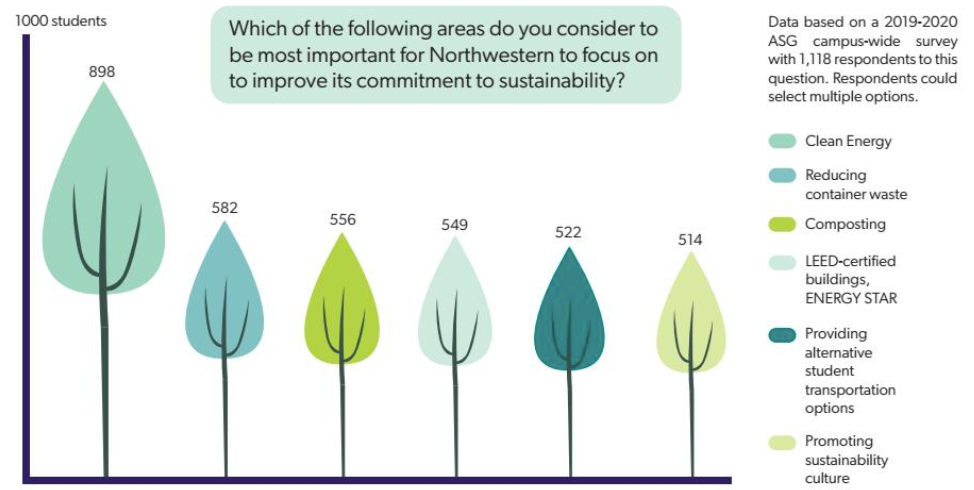What students want to see from Northwestern's push for sustainability.
Kate Lee ate a ham sandwich for breakfast one day in high school. Soon after, she learned that producing a kilogram of beef has the equivalent water footprint of a 92-minute shower. By lunchtime, she decided to never eat meat again.
Now a first-year at Northwestern, Lee continues to push for environmentally sustainable food systems. Earlier this year, she co-founded the #NoBeef campaign at Northwestern. The group, based on the international #NoBeef movement, educates people about reasons to shift away from today’s beef industry.
#NoBeef is part of a larger movement among Northwestern activists that is working to push for the prioritization of sustainability.
While the large-scale implementation of sustainability initiatives is primarily up to the University, students are finding ways to push for further action.
Associated Student Government’s (ASG) annual campus-wide survey this year included two questions on sustainability. One asked how much students agree with the statement “I commit myself to a sustainable lifestyle in my daily life (recycling, reducing food waste and trash, limiting water usage).” Of the 1,140 respondents, 78 percent said they strongly or somewhat agree.

Fossil Free Northwestern is an organization that pushes for divestment from fossil fuels and transition to renewable energy. The club, whose members include students, faculty, staff and alumni, advocates for climate justice and sustainable endowments through student protests, petitions and demonstrations.
Last spring, a group of Fossil Free members — including three students — submitted a proposal to the Advisory Committee on Investment Responsibility (ACIR). It called for the University to divest from the top 100 coal and oil and gas companies within five years, and to implement new renewable investment plans. The ACIR accepted the proposal and voted in June to recommend it to Northwestern’s board of trustees. On Feb. 20, however, the board’s Investment Committee rejected the proposal, arguing that divestment wouldn’t result in the positive environmental change that Fossil Free is aiming for.
The rejection came just a week after a “die-in” and “environmental teach- in” organized by Fossil Free for World Divestment Day. On social media, the organization wrote that it is crafting an intentional response to the rejection.
Madison Smith, a member of Fossil Free, cares about divestment from fossil fuels for both environmental and social justice reasons.
“The people who are allowing all this money to be put into fossil fuels, they’re going to be the ones who are benefitting from all this money,” Smith says. “It’s not going to be us who are affected by fossil fuels, it’s the people who are on the equator, people who are from third world countries; people who have a low socioeconomic status, because those are the people who don’t have any power against climate change.”
Student organizations also tackle sustainability issues beyond clean energy. The ASG Sustainability committee is working with Real Food at NU, a club that advocates for a transition to a local, humanely-sourced University food supply, to increase composting. Lauren Simitz, the Committee’s vice president, says the groups have started a composting pilot program in Norris, the only food service building on campus that still lacks composting.
In Our Nature (ION), a digital publication that covers environmental issues and sustainability on campus, addresses another initiative: promoting sustainability culture.
Margo Milanowski, co-editor at ION, says many don’t see sustainability as enough of a necessity. “We all need to be living sustainable lives, so writing for a publication like In Our Nature is a step in the right direction.”
Bella Wilkes, the other co-editor, agrees. “What sustainability means to me is education,” she says. “If you look at any issue, especially recently, you can connect it back to the environment. What people need is ... reading, researching because these are the problems that are affecting us now, but even more so in 20, 30 years from now.”